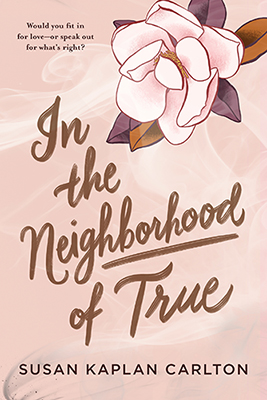Discussion Guide
In the Neighborhood of True
Book Talk
After her father’s death, Ruth Robb and her family transplant themselves in the summer of 1958 from New York City to Atlanta. In her new hometown, Ruth quickly figures out she can be Jewish or she can be popular, but she can’t be both. Eager to fit in with the blond girls in the “pastel posse,” Ruth decides to hide her religion. Before she knows it, she is falling for the handsome and charming Davis and sipping Cokes with friends at the all-white, all-Christian Club. Does it matter that Ruth’s mother makes her attend services at the local synagogue every week? Not as long as nobody outside her family knows the truth. At temple Ruth meets Max, who is serious and intense about the fight for social justice, and now she is caught between two worlds, two religions, and two boys. But when a violent hate crime brings the different parts of Ruth’s life into sharp conflict, she will have to choose between all she’s come to love about her new life and standing up for what she believes.
About the Author
Susan Kaplan Carlton currently teaches writing at Boston University. The author of Love & Haight and Lobsterland, her writing has also appeared in Self, Elle, Mademoiselle, and Seventeen. She lived for a time with her family in Atlanta, where her daughters learned the finer points of etiquette from a little pink book and the power of social justice from their synagogue.
Praise for In the Neighborhood of True
“The story may be set in the past, but it couldn’t be a more timely reminder that true courage comes not from fitting in, but from purposefully standing out… and that to find out who you really are, you have to first figure out what you’re not.”
—Jodi Picoult, New York Times bestselling author of A Spark of Light and Small Great Things
“Carlton captures… the time and place with admirable nuance. The dialogue and setting are meticulously constructed, and readers will feel the humidity and tension rising with each chapter.”
—Publishers Weekly, starred review
Discussion Questions
- The book opens with an epigraph that includes the line: “When the wolves of hate are loosed on one people, then no one is safe.” What does this mean in relation to the novel?
- The phrase “in the neighborhood of true” appears a few times in the novel. What is the difference between something close enough to the truth and a lie? When is it okay to not tell the whole truth?
- Ruth doesn’t tell her new friends or Davis that she’s Jewish, but no one questions her about it either. Does she have an obligation to announce her identity? Can you actually be close to someone who doesn’t know everything about you?
- Why does becoming a debutante appeal to Ruth? What is she hoping for through this process?
- Ruth’s mother and grandfather both write for the local newspaper. What does Ruth learn from their work? What role does reporting play in the novel?
- Rabbi Selwick and Max both feel called to advocate for equal civil rights. What might have led them to this? In what ways do they protest or try to change society? Do you believe they are making any progress?
- Ruth loves fashion, carefully preparing her outfits and taking note of what everyone around her is wearing. At one point, Ruth defends her interest in fashion as not shallow. Do you agree? What do these details add to the story and to your reading experience?
- Ruth hides part of who she is to fit in with the pastel posse. Have you ever changed the way that you present yourself in order to fit in? How does modern technology like social media factor into the impulse to fit in?
- There are a lot of different rules and guides for societal behavior in the novel–from the pink book to Jim Crow segregation. What purpose do those rules serve in the Atlanta of the novel? In what ways do the characters follow those rules and in what ways do they break them? What rules in the 21st century, written or unwritten, work the same way for us?
- Davis insists that his brother isn’t a bad person. Why does he defend him? Is it possible for Davis to stand by his family and still love Ruth?
- Ruth’s family tells her that she did the right thing by speaking up, but she’s unsure if she made a difference in the end. Do you think she did? Is there value in standing up for what you believe in even if it doesn’t seem to change anything?
- The characters in In the Neighborhood of True experience losses—the loss of Ruth’s father, the loss of love, and the loss of a spiritual home. How do those losses change them?
- The temple bombing was based on a real event and the author’s note discusses some of the ways this event echoes into the current day. In your view, how has society progressed or stayed the same since the 1958 Atlanta Temple bombing? What can we learn now from the characters in the novel and their stories?


